Overview
In the fast-paced world of tech startups, many founders grapple with the challenge of establishing a meaningful brand presence. This struggle often leads to feelings of uncertainty and frustration, as they navigate a landscape filled with competition and ever-changing market demands. It’s not just about having a product; it’s about creating a brand that resonates with their audience and stands out in the crowd.
Understanding the importance of a strong brand identity can be overwhelming. Founders may feel lost when it comes to defining their brand purpose or setting clear marketing goals. They might wonder how to develop a cohesive brand voice that truly reflects their values and connects with potential customers. Choosing the right marketing channels can also feel daunting, especially when every decision seems crucial to their success.
However, there is hope. By focusing on five essential brand strategies, tech startups can carve out a distinct niche in the market. These strategies include:
- Defining brand purpose
- Setting marketing goals
- Developing a cohesive brand voice
- Choosing effective marketing channels
- Measuring performance
Each of these elements plays a vital role in fostering customer loyalty and driving business growth.
By implementing these strategies, startups can not only establish a strong brand identity but also engage effectively with their audience. This nurturing approach helps them adapt to the dynamic market landscape, ensuring they remain resilient and responsive to their customers' needs. Remember, you are not alone in this journey; many have walked this path and emerged stronger. Embracing these strategies can lead to a fulfilling brand experience that resonates deeply with your audience, ultimately paving the way for lasting success.
Introduction
In the rapidly evolving landscape of technology startups, establishing a strong brand identity is not just beneficial; it is essential for survival. Many founders find themselves overwhelmed by the complexities of marketing strategies, feeling the weight of the challenges that lie ahead. Yet, understanding the core elements that define a brand's purpose and values can unlock significant opportunities for growth and customer loyalty.
How can tech startups effectively align their marketing efforts with their unique identities to stand out in a crowded marketplace? This article delves into five essential brand strategies that can transform marketing approaches and foster lasting connections with audiences, offering a supportive pathway for those navigating this journey.
Define Your Brand Purpose and Values
To define your , begin by reflecting on some essential questions:
- What problem does your technology seek to address?
- What for your brand?
For example, consider a startup dedicated to ; it might highlight innovation and a commitment to environmental responsibility. Clearly articulating these values in your is crucial, as is ensuring they resonate in every . This alignment not only attracts customers who share similar values but also lays a , enabling you to communicate your (USP) effectively. By nurturing this connection, you foster a and valued.
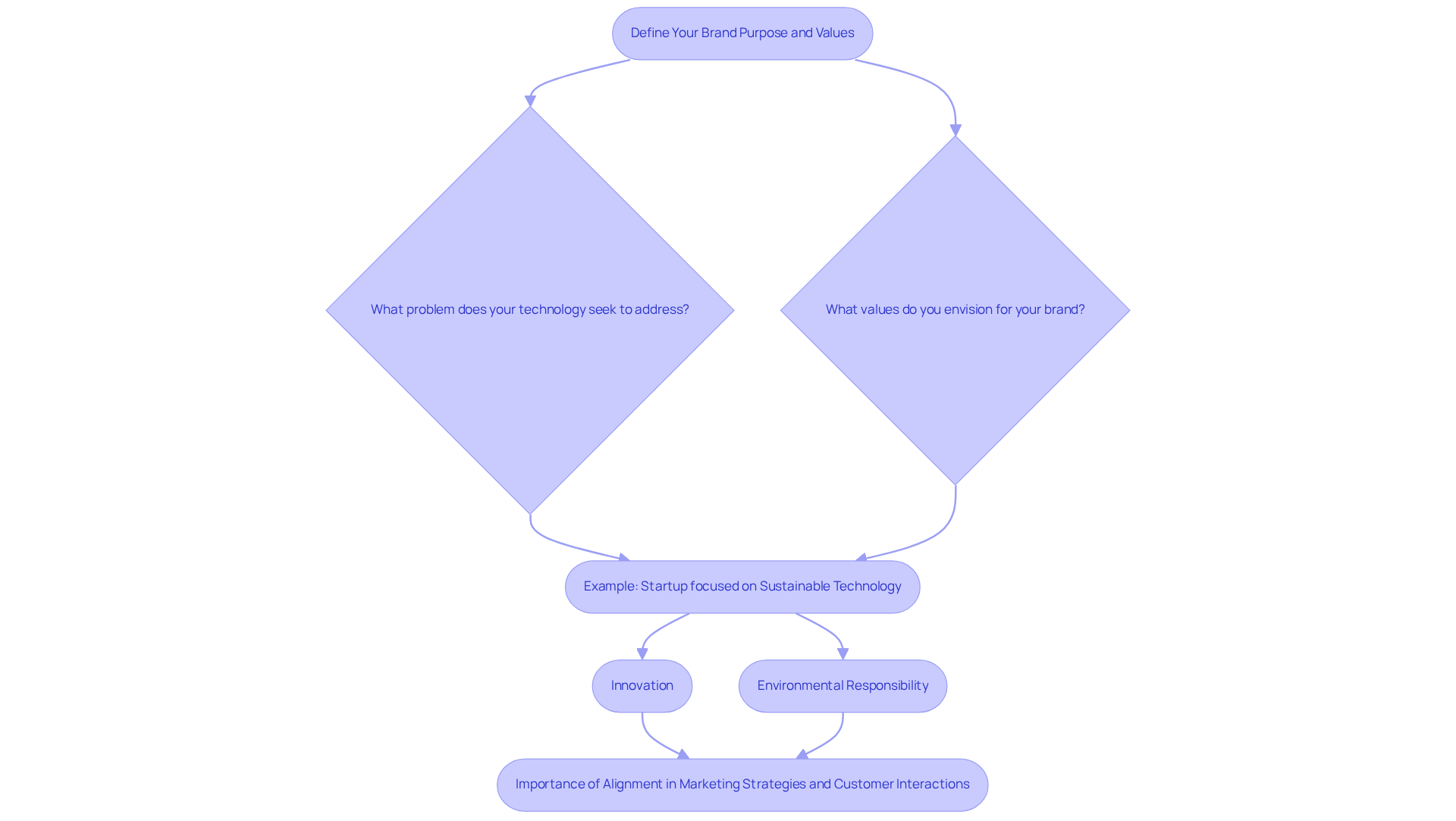
Set Clear Marketing Goals Aligned with Brand Identity
For tech startups, establishing that truly reflect your company's objectives can feel daunting. It's a common struggle—how do you measure success in a way that resonates with your vision? If your goal is to position your company as a , you might aim to within six months through focused content techniques. However, it’s essential to regularly revisit these goals. The market is ever-changing, and adapting to these dynamics is vital for nurturing your .
When your , you create a cohesive approach that not only enhances recognition but also through effective . Many new businesses find that integrating their promotional strategies with brand strategies in marketing leads to a significant rise in customer loyalty and market share. This integration is not just a tactic; it’s a crucial element of .
Moreover, keeping an eye on actionable metrics like and Net Promoter Score (NPS) can provide you with valuable insights into how well your promotional efforts are resonating. As Carl Lager wisely noted, "In order to do that, you need to track the right startup metrics." It’s also important to steer clear of common pitfalls, such as misalignment between your marketing efforts and messaging. These misalignments can hinder your progress toward achieving your objectives.
Remember, you’re not alone in this journey. Many founders have faced similar challenges, and by fostering a supportive environment that prioritizes alignment and understanding, you can pave the way for a more successful path forward.
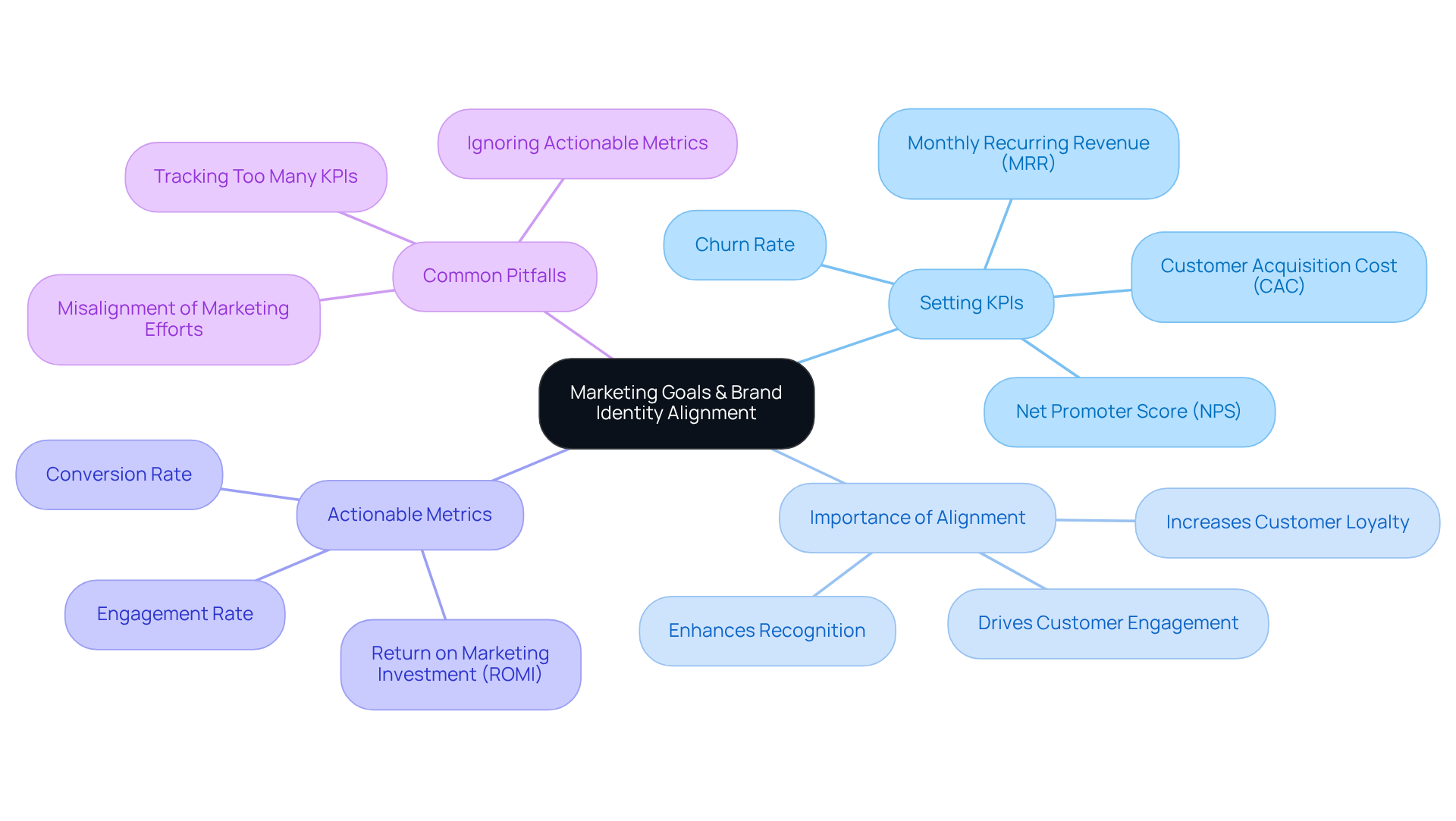
Develop a Cohesive Brand Voice and Messaging Strategy
Establishing a can feel overwhelming for many tech startup founders. It’s crucial to . Will your approach be professional and authoritative, or more casual and friendly? This decision is not just about preference; it shapes how your audience perceives you. Imagine a tech startup that focuses on user-friendly solutions. A conversational tone might be the perfect fit, emphasizing accessibility and approachability, which can resonate deeply with potential users.
Consistency across all platforms—social media, website, and customer service—plays a vital role in reinforcing your identity. It fosters a , creating a sense of trust. Research shows that by 10-20%, while a uniform presentation can enhance revenue by as much as 23%. This underscores the importance of in marketing for the tech industry.
Moreover, companies that maintain a are 3.5 times more likely to achieve improved visibility in the market. This makes it with your target audience. As you develop your messaging approach, remember that 81% of consumers need to trust a brand before making a purchase. This highlights the necessity of a dependable and recognizable brand voice.
The cautionary tale of Gap's failed rebranding serves as a reminder of the . It reinforces the need for a cohesive approach, ensuring you connect with your audience on a personal level. By nurturing this connection, you can .
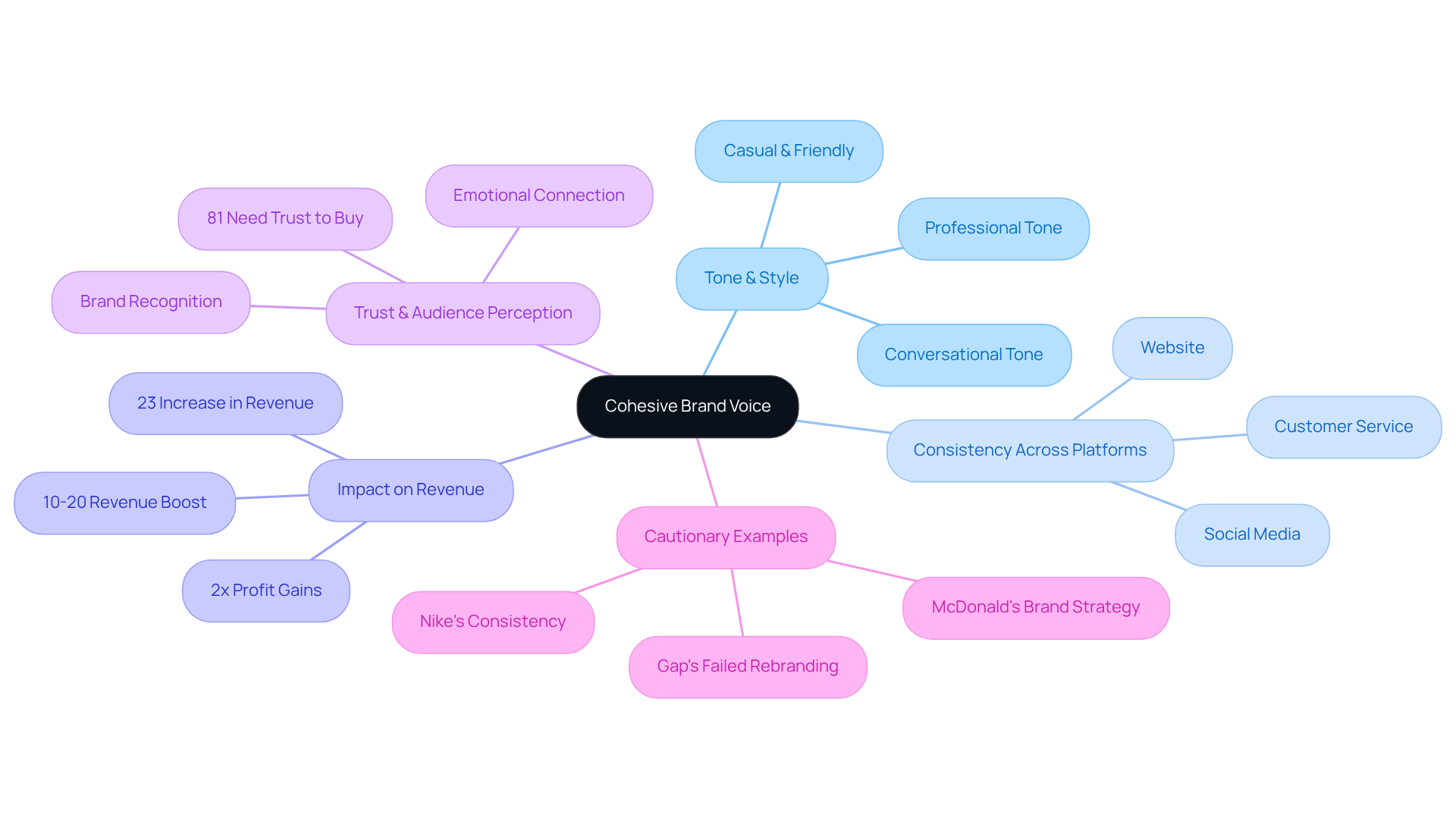
Choose Effective Marketing Channels for Brand Communication
Identifying the platforms where your target audience is most active can often feel overwhelming. For many technology enterprises, this challenge frequently revolves around social media platforms—LinkedIn serves as a vital space for B2B engagement, while Instagram shines for B2C interactions. The implications of not reaching the right audience can be significant, leaving valuable insights and innovations unheard.
To address this, consider like:
- Blogs
- Webinars
- Podcasts
These can help in the industry. For example, imagine a startup specializing in to educate potential customers about their technology. This not only showcases expertise but also builds trust and connection.
It's essential to customize your content to suit these selected channels, ensuring it aligns with your and messaging approach. By doing so, you can , fostering a nurturing relationship with your audience.
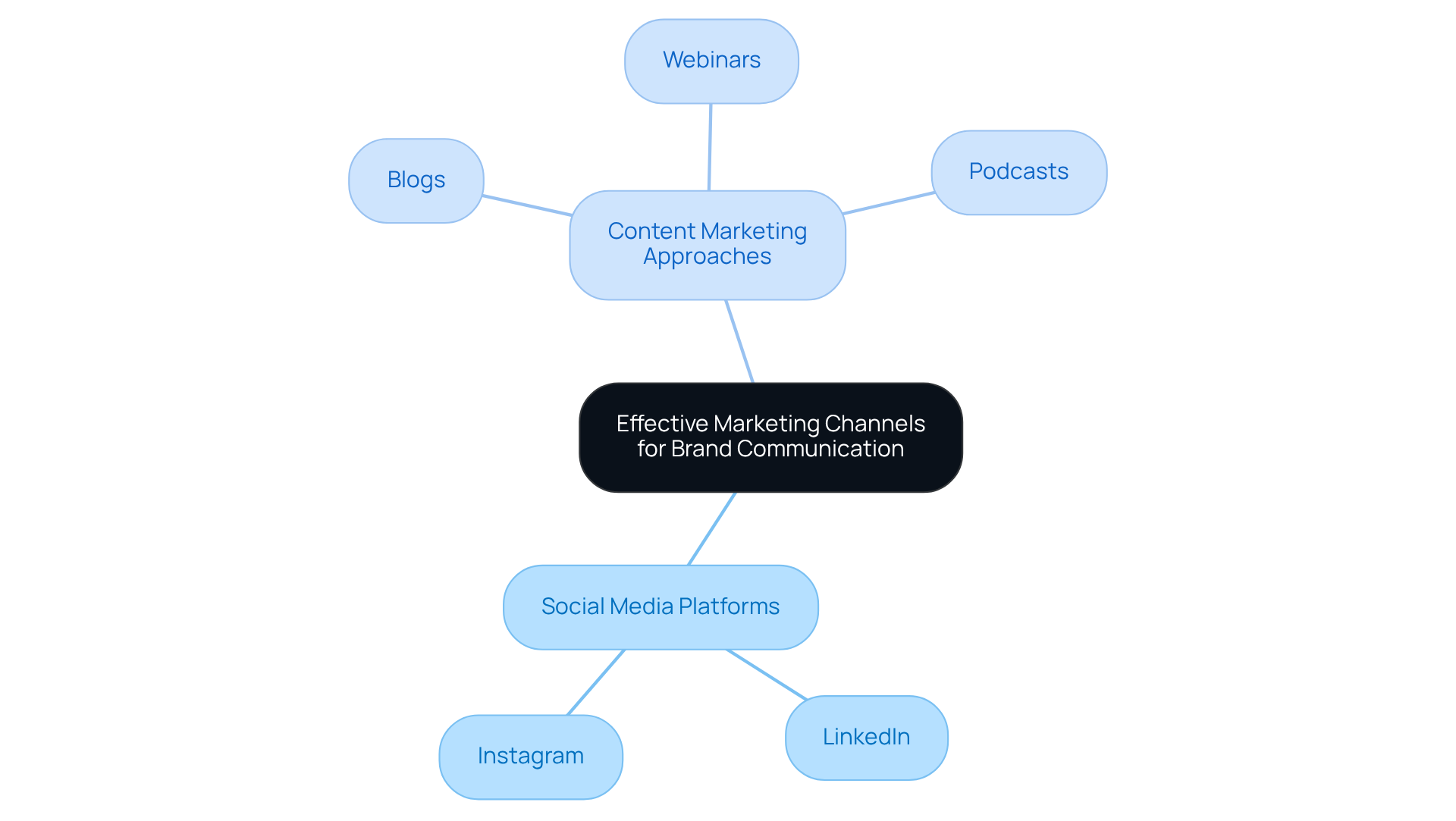
Measure and Analyze Marketing Performance for Continuous Improvement
It's common for tech startup founders to feel overwhelmed by the complexities of promotional campaigns. You might find that despite your best efforts, your aren’t yielding the expected results. This can be disheartening, especially when you see substantial traffic from a social media campaign but struggle with low conversion rates. Such discrepancies can indicate a need to refine your messaging or better define your target audience, which is .
Regularly reviewing —like website traffic, conversion rates, and customer engagement levels—can help you identify emerging trends and make necessary adjustments. This iterative approach not only enhances your promotional effectiveness but also supports , keeping your brand agile and responsive to the ever-changing market dynamics.
As industry leaders emphasize, is crucial; it’s about more than just evaluating results. It’s about pinpointing obstacles in your sales funnel that may hinder performance. Sunil Gupta wisely notes, 'It isn’t sufficient to assess the final result alone; you also need to monitor intermediate metrics to comprehend where consumers might be encountering obstacles—essentially bottlenecks in the sales funnel.'
With over 2.6 billion online buyers globally, tracking these metrics has never been more vital. Key performance indicators (KPIs), such as and , are essential tools for evaluating your promotional efficiency. Utilizing resources like Google Analytics and HubSpot can provide you with valuable insights, empowering you to make informed, data-driven decisions. By integrating these practices into your [brand strategies in marketing](https://blog.rno1.com/4-essential-practices-for-effective-branding-design-in-tech), you can ensure that your marketing efforts resonate deeply with your target audience while being effective.
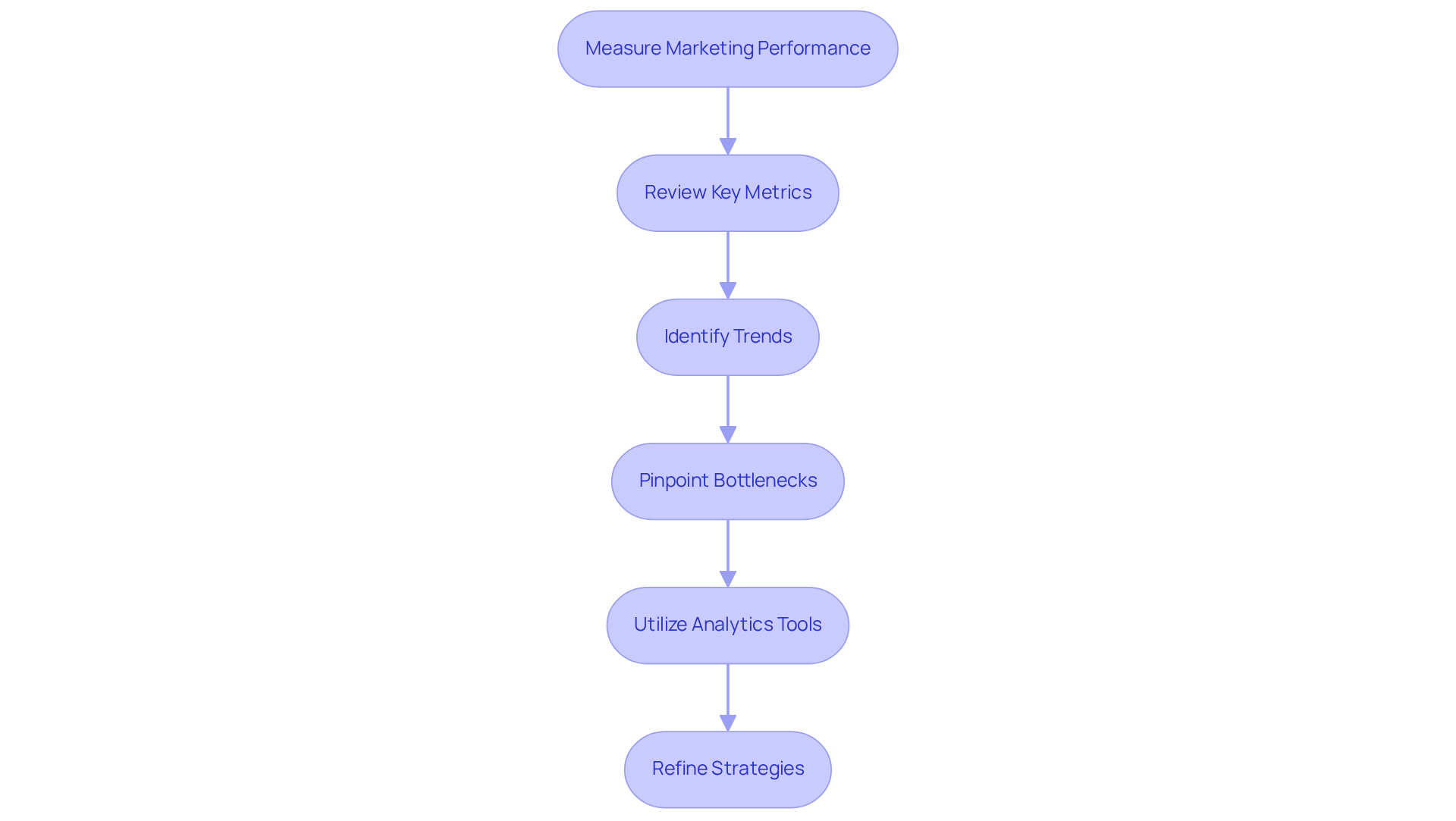
Conclusion
Defining and executing effective brand strategies can feel daunting for tech startups striving to find their place in a crowded marketplace. The challenge of establishing a clear brand purpose and values is significant, yet it is a vital step toward creating a strong identity that truly resonates with your audience. This foundational process not only articulates your unique selling propositions but also fosters a sense of community, nurturing customer loyalty along the way.
Throughout this journey, it’s essential to align your marketing goals with your brand identity. Developing a cohesive brand voice, selecting the right communication channels, and continuously measuring your performance are all crucial components of this holistic approach. Each strategy contributes to enhancing your brand visibility and deepening customer connections. By thoughtfully integrating these elements, you can navigate challenges and adapt to the ever-changing market dynamics, ensuring your startup remains relevant and poised for sustained growth.
Ultimately, building a successful tech startup is a continuous journey of reflection and adaptation. Embracing these essential brand strategies not only positions you for immediate success but also lays the groundwork for long-term resilience. As the tech landscape evolves, prioritizing brand alignment and effective communication will be key in capturing the attention and trust of potential customers. Remember, you are not alone in this process; the shared experiences of fellow founders can provide invaluable insights and support. Together, we can foster a community that thrives on collaboration and understanding.
Frequently Asked Questions
How can I define my brand's purpose and values?
To define your brand's purpose, reflect on key questions such as what problem your technology addresses and what values you envision for your brand. Clearly articulating these values in your marketing strategies is crucial, as it helps attract customers who share similar values and strengthens your brand identity.
Why is it important to align marketing goals with brand identity?
Aligning marketing goals with brand identity creates a cohesive approach that enhances recognition and drives customer engagement. This integration can lead to increased customer loyalty and market share, making it a vital element of effective brand strategies in marketing.
What are key performance indicators (KPIs) for tech startups?
KPIs for tech startups should reflect the company's objectives and can include metrics such as website traffic growth, customer acquisition cost (CAC), and net promoter score (NPS). Regularly revisiting these goals is essential to adapt to market changes and ensure business growth.
How can I measure success for my tech startup?
Success can be measured by setting clear, actionable goals that resonate with your vision, such as increasing website traffic by a specific percentage within a set timeframe. Tracking metrics like CAC and NPS can provide insights into the effectiveness of your promotional efforts.
What common pitfalls should I avoid in my marketing efforts?
Common pitfalls include misalignment between your marketing efforts and messaging, which can hinder progress toward achieving your objectives. It's important to ensure that your promotional strategies are integrated with your brand identity to avoid these issues.
How can I foster a supportive environment for my startup?
By prioritizing alignment and understanding among your team, you can create a supportive environment that helps navigate challenges. Sharing experiences and fostering open communication can contribute to a more successful path forward for your startup.




